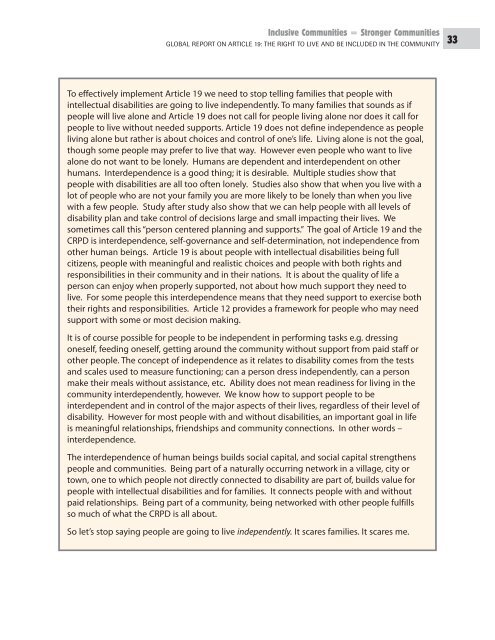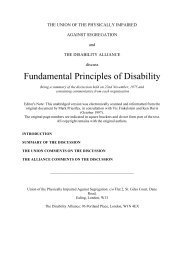Global-Report-Living-Colour-dr2-2
Global-Report-Living-Colour-dr2-2
Global-Report-Living-Colour-dr2-2
You also want an ePaper? Increase the reach of your titles
YUMPU automatically turns print PDFs into web optimized ePapers that Google loves.
Inclusive Communities = Stronger Communities<br />
GLOBAL REPORT ON ARTICLE 19: THE RIGHT TO LIVE AND BE INCLUDED IN THE COMMUNITY<br />
33<br />
To effectively implement Article 19 we need to stop telling families that people with<br />
intellectual disabilities are going to live independently. To many families that sounds as if<br />
people will live alone and Article 19 does not call for people living alone nor does it call for<br />
people to live without needed supports. Article 19 does not define independence as people<br />
living alone but rather is about choices and control of one’s life. <strong>Living</strong> alone is not the goal,<br />
though some people may prefer to live that way. However even people who want to live<br />
alone do not want to be lonely. Humans are dependent and interdependent on other<br />
humans. Interdependence is a good thing; it is desirable. Multiple studies show that<br />
people with disabilities are all too often lonely. Studies also show that when you live with a<br />
lot of people who are not your family you are more likely to be lonely than when you live<br />
with a few people. Study after study also show that we can help people with all levels of<br />
disability plan and take control of decisions large and small impacting their lives. We<br />
sometimes call this “person centered planning and supports.” The goal of Article 19 and the<br />
CRPD is interdependence, self-governance and self-determination, not independence from<br />
other human beings. Article 19 is about people with intellectual disabilities being full<br />
citizens, people with meaningful and realistic choices and people with both rights and<br />
responsibilities in their community and in their nations. It is about the quality of life a<br />
person can enjoy when properly supported, not about how much support they need to<br />
live. For some people this interdependence means that they need support to exercise both<br />
their rights and responsibilities. Article 12 provides a framework for people who may need<br />
support with some or most decision making.<br />
It is of course possible for people to be independent in performing tasks e.g. dressing<br />
oneself, feeding oneself, getting around the community without support from paid staff or<br />
other people. The concept of independence as it relates to disability comes from the tests<br />
and scales used to measure functioning; can a person dress independently, can a person<br />
make their meals without assistance, etc. Ability does not mean readiness for living in the<br />
community interdependently, however. We know how to support people to be<br />
interdependent and in control of the major aspects of their lives, regardless of their level of<br />
disability. However for most people with and without disabilities, an important goal in life<br />
is meaningful relationships, friendships and community connections. In other words –<br />
interdependence.<br />
The interdependence of human beings builds social capital, and social capital strengthens<br />
people and communities. Being part of a naturally occurring network in a village, city or<br />
town, one to which people not directly connected to disability are part of, builds value for<br />
people with intellectual disabilities and for families. It connects people with and without<br />
paid relationships. Being part of a community, being networked with other people fulfills<br />
so much of what the CRPD is all about.<br />
So let’s stop saying people are going to live independently. It scares families. It scares me.



